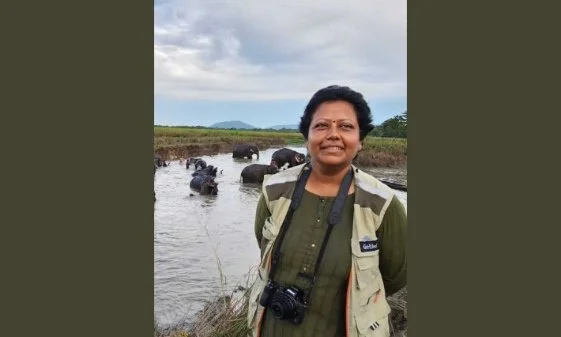IFS Officer Sonali Ghosh Wins Global Award for Wildlife Rehab
Her Work Focuses on Returning Rescued and Captive-Bred Animals to the Wild
October 13, 2025
Dr. Sonali Ghosh, field director of Kaziranga National Park and Tiger Reserve, has won the WCPA-Kenton Miller Award for her innovative contributions to wildlife area conservation. Her work focuses on what happens to wild animals that are rescued or bred in captivity, and how they can be returned to their natural habitats. It points to the need for a major shift in how wildlife conservation is currently practiced in India.
One of the most important parts of Dr. Ghosh’s work is the successful release of clouded leopard cubs, born in captivity, back into the wild, as noted by The Telegraph. This is difficult to achieve. The clouded leopard is a shy and rarely seen animal that lives in the forests of Northeast India and Southeast Asia. Releasing a carnivore that has never lived in the wild requires careful planning.
Animals raised in captivity often do not know how to hunt, fear humans, or survive on their own. These are behaviours they would normally learn from their mothers in the wild. Dr. Ghosh has called her effort a process of “trial and error,” and it was made possible by constant learning and strong support from trained animal keepers and veterinary staff.
She and her team raised the cubs themselves from a very young age, feeding them by bottle and caring for them in place of their mother. They kept human contact to a minimum so the animals would not become too used to people. As the cubs grew, they were slowly taught the skills they would need to live in the wild, such as hunting for food, climbing trees and staying away from danger. The team watched them closely at every stage, making changes whenever something was not working.
Her success in this area questions a long-standing belief in Indian wildlife management, where captive breeding has largely been seen as symbolic or meant for public education, rather than as a way to support wild animal populations. She has said that India’s captive breeding programmes need a “complete revamp.” She does not reject the role of zoos, but believes their main purpose should be to educate people about wildlife and ecosystems. In her view, zoos should not focus on breeding large numbers of animals that are never released into the wild. Instead, captive breeding should be designed to support the recovery of species in their natural habitats.
She believes that “every rescued wild animal must be given a chance of rehabilitation in the wild.” This view is built on the principle that wild animals are meant to live in their natural habitats. In India, many animals that are rescued after being injured, orphaned, or displaced often end up spending their lives in zoos or rescue centres. Dr. Ghosh argues that this should happen only in rare cases. She maintains that more animals should be prepared and supported to return to the wild, rather than being kept in captivity as the simpler option.
For this to work, the systems in place must be prepared. At present, wildlife rescue is often managed by teams that are overworked and lack proper training. They also have limited access to modern equipment, medicines, diagnostic tools and clear treatment methods.
Across many parts of India, growing numbers of wild animals are being pushed out of their natural habitats. This happens as forests are cleared for roads, farms, and buildings, and as changing weather patterns affect the places where animals live. In many cases, animals also come into contact with people while looking for food or shelter, which often leads to conflict. Therefore, having a proper rescue and rehabilitation programme is essential. This means using science-based methods to safely care for these animals, treat their injuries and help them return to the wild whenever possible.
Dr. Ghosh’s work matters to all citizens. The well-being of wildlife and natural ecosystems is closely tied to clean water, fresh air, stable climate and food security. Helping animals return to the wild and restoring their habitats also supports the balance that human life depends on.
The WCPA-Kenton Miller Award Dr. Ghosh has received is one of the most respected international honours in the field of protected area management. It recognises individuals who have made outstanding contributions to conservation through bold, practical innovation, often in challenging conditions. Winning this award places her among a small group of global leaders whose work is seen as setting new standards for how protected areas can be managed and improved.
You have just read a News Briefing by Newsreel Asia, written to cut through the noise and present a single story for the day that matters to you. Certain briefings, based on media reports, seek to keep readers informed about events across India, others offer a perspective rooted in humanitarian concerns and some provide our own exclusive reporting. We encourage you to read the News Briefing each day. Our objective is to help you become not just an informed citizen, but an engaged and responsible one.

